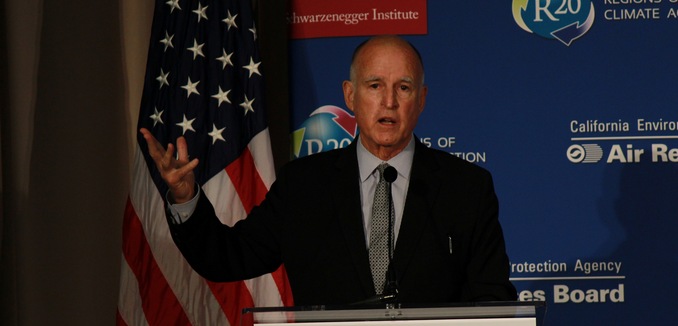Governor Jerry Brown signed a bill on Saturday banning California from contracting companies that discriminate against any federally recognized nation or peoples, including Israel.
Assembly Bill 2844, which unanimously passed California’s assembly at the end of August, requires that companies seeking to do business with the state verify that they are not violating its civil rights laws while boycotting a foreign country. Israel, which has been singled out by proponents of the Palestinian-led Boycott, Divestment, and Sanctions campaign, is the only country mentioned by name in the legislation.
While Brown was expected to approve the bill for several weeks, he made no announcement in advance of the signing on Saturday afternoon, The Jewish Journal reported.
“The bill sends the clear and unmistakable message that the state of California wants no part of the goals and tactics of the BDS movement,” Janna Weinstein Smith, the Los Angeles director of the American Jewish Committee, said in a statement praising the signing of the measure.
California is the twelfth state to pass a bill against BDS on the grounds of its discriminatory nature, according to a count by Palestine Legal, which works on behalf of pro-Palestinian campaigners.
Prime Minister Benjamin Netanyahu signed a number of agreements with Brown while visiting California in 2014, including one to provide the Golden State with training in “water conservation and desalination techniques” developed by Israeli scientists.
In August, New Jersey Gov. Chris Christie signed a law barring his state’s pension fund from investing in companies that boycott Israel. In June, New York Governor Andrew Cuomo signed an executive order prohibiting the state from doing business with any entity that boycotts Israel. Other states that have passed anti-BDS legislation include Illinois, South Carolina, Tennessee, Arizona, Georgia, Colorado, Florida, and Alabama. Advocates of these measure have emphasized that the legislation does not raise any First Amendment issues because private parties are still free to boycott Israel, but states may be obligated to avoid promoting or supporting discrimination based on religion, race, or nationality.
Following passage of the Illinois bill last year, legal expert Eugene Kontorovich said that the measure reflected an understanding that “BDS is not like the civil rights protests, as its supporters love to claim, but rather more like the anti-Jewish boycotts so common in Europe in the 20th century, and in the Arab world until this day.” Last month, the student body at one of Europe’s oldest universities similarly denounced the BDS campaign as anti-Semitic, saying that it recalls the Nazi-era slogan, “Don’t buy from Jews.”
Foreign investment in Israel has nearly tripled since the BDS campaign was formally launched by Palestinian groups in 2005, hitting a record high of $285.12 billion last year.
Jonathan Schanzer, vice president for research at the Foundation for Defense of Democracies, outlined at a congressional hearing in April how members of a network that used to fund Hamas have become the driving force behind the BDS campaign in the United States through the group American Muslims for Palestine.
The BDS campaign attempts to delegitimize and isolate Israel in an effort to advance Palestinian interests, and many of its leaders have publicly affirmed that they seek Israel’s destruction. BDS co-founder Omar Barghouti, an opponent of the two-state solution, said in 2014 that Palestinians have a right to “resistance by any means, including armed resistance,” while leading activist As’ad Abu Khalil acknowledged in 2012 that “the real aim of BDS is to bring down the state of Israel.”
[Photo: Governor Jerry Brown / Flickr ]




